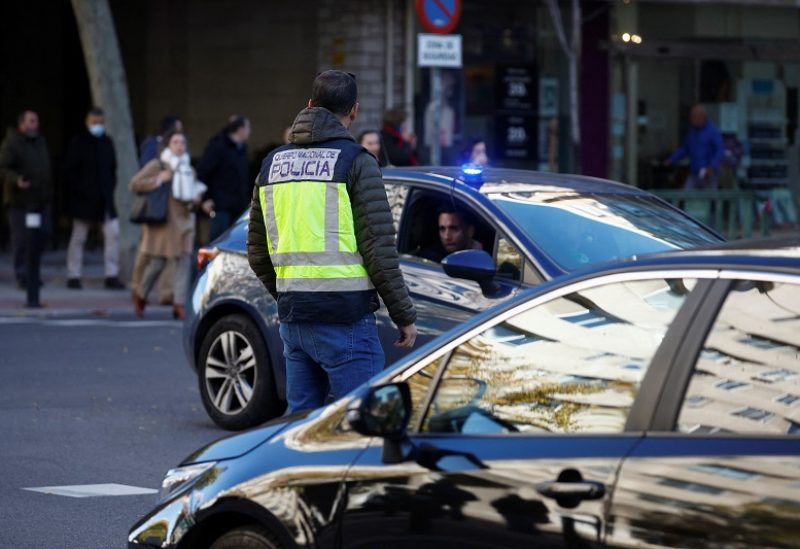
A Spanish police officer stands near Spain's Ministry of Defense after suspected explosive devices hidden in envelopes were mailed to the ministry, in the wake other packages sent to targets connected to Spanish support of Ukraine, amidst Russia’s invasion of Ukraine, in Madrid, Spain December 1, 2022. REUTERS/Juan Medina
The Spanish Interior Ministry said on Thursday, that Spain has stepped up security at public and diplomatic buildings after a spate of letter-bombs were sent to targets including the Spanish Prime Minister Pedro Sanchez and the Ukrainian embassy.
The ministry said that an “envelope with pyrotechnic material” addressed to Sanchez was received on Nov. 24 and disarmed by his security team.
The device was “similar” to subsequent packages received by the Ukrainian embassy and a Spanish arms firm on Wednesday, it said, and a device intercepted at Spain’s Torrejon de Ardoz air force base in the early hours of Thursday morning.
The first letter-bomb was received and opened by a security officer at the Ukrainian embassy on Wednesday lunchtime and exploded, causing minor injuries to the official.
Ambassador Serhii Pohoreltsev told the Ukrainian news site European Pravda that the suspicious package addressed to him was handed to the embassy’s Ukrainian commandant.
“The package contained a box, which raised the commandant’s suspicions and he decided to take it outside – with no one in the vicinity – and open it,” Pohoreltsev was quoted as saying.
“After opening the box and hearing a click that followed, he tossed it and then heard the explosion…Despite not holding the box at the time of the explosion, the commandant hurt his hands and received a concussion.”
EU SATELLITE CENTRE ALSO TARGETED
After the first incident, Ukrainian Foreign Minister Dmytro Kuleba ordered all of Kyiv’s embassies abroad to “urgently” strengthen security and urged Spain to investigate the attack, a Ukrainian ministry spokesperson said.
A second package was confirmed to have been received on Wednesday night at the headquarters of Spanish weapons manufacturer, Instalaza in Zaragoza, in northeastern Spain, police said.
Instalaza manufactures the C90 rocket launcher that Spain has supplied to Ukraine.
Spanish security forces found a third suspected explosive device hidden in an envelope mailed to a European Union satellite center located at an air force base in Torrejon de Ardoz, outside Madrid, the defense ministry said.
After scanning the envelope by X-ray, air force security officers determined it contained “a mechanism,” the ministry statement said.
The satellite center supports the EU’s common foreign and security policy by gathering information from space intelligence devices, according to its website. EU Foreign Policy Chief Josep Borrell described such systems as “the eyes of Europe” in September.
Spanish newspaper El Mundo reported that another device had been sent to Spain’s Ministry of Defense in Madrid, but this has not yet been confirmed by the authorities.
Spain’s High Court, which specializes in terrorism offenses, has opened a probe into the attack.